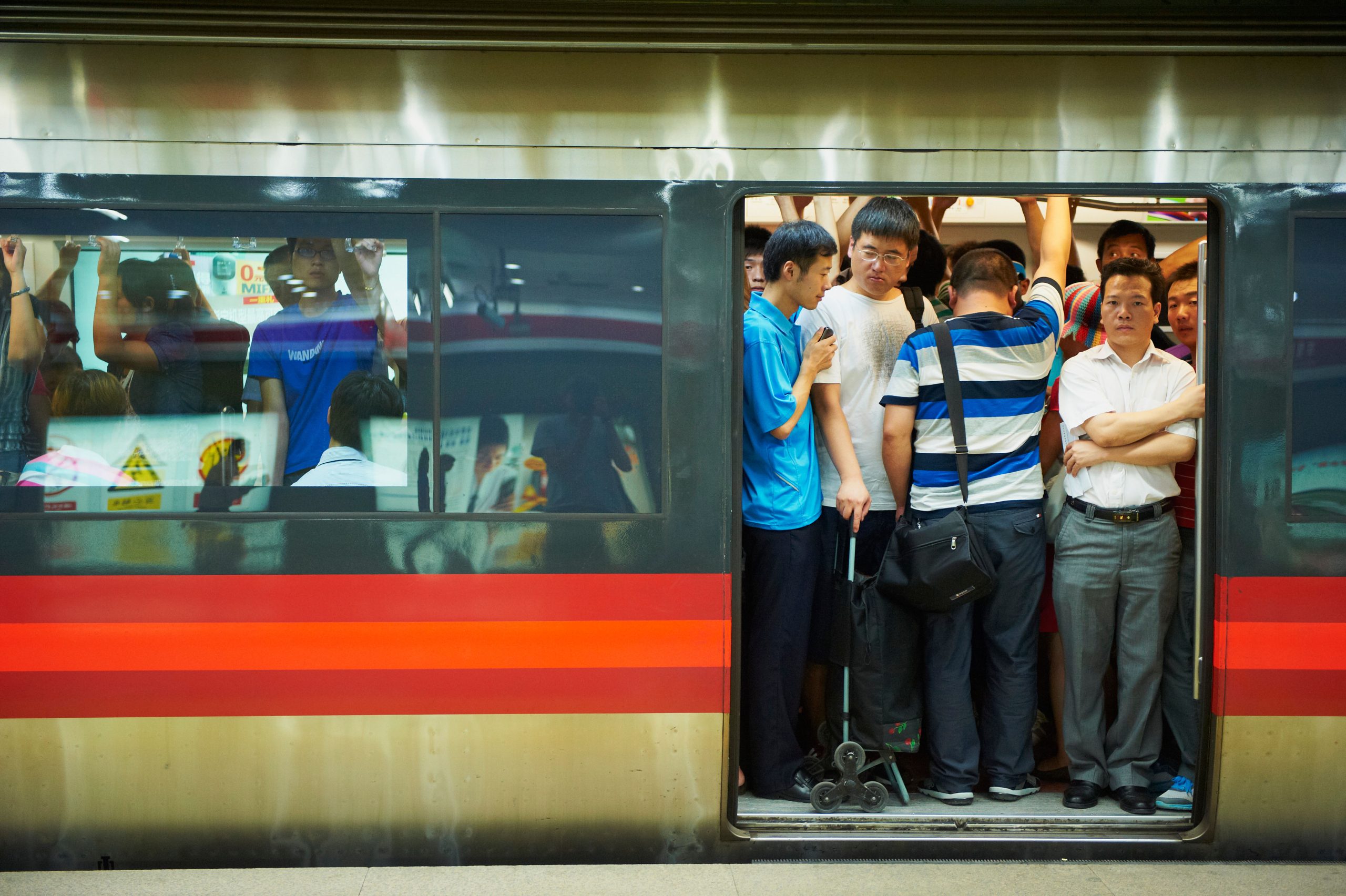This article first appeared in Volume 54, Issue 2 of our print edition of Index on Censorship, titled Land of the Free?: Trump’s war on speech at home and abroad, published on 21 July 2025. Read more about the issue here.
It was late one night in September, but the Beijing subway was still noisy and crowded. Most of the passengers were young commuters returning home from work. Ken was sitting in a corner of the carriage and didn’t know exactly how it happened.
“It seemed like someone standing in the middle of the carriage began to sing and some others joined him,” Ken said. “By the time I noticed it, half of the passengers were singing together.”
The song was called “I Finally Believed in Fate”. A video later circulated online with subtitles, although these differed from what they sang, Ken recalled. Ken and I are chatting over Signal, myself in Australia and Ken still in Beijing. “Such songs are called depressing songs. It is all about frustration and pain,” he said. “But there’s no one to blame and nothing that can be done.”
I’m tired of the unfairness of the world
I’m tired of false love
I’ve broken the vinegar bottle of life
There’s so much pain in my heart
I’m all alone in a foreign land
Who can I tell my heart to?
I dried my tears and my heart broke
I finally believed in fate
In recent years, such things happen frequently, perhaps out of a momentary burst of emotion, or possibly a planned action. Many songs are sung, including “I Finally Believed in Fate”, or “People Without Dreams Won’t Be Sad” or “When I’m Done With All This Suffering”. These songs are popular among young people, but cannot reach the top of the charts because they mostly express “negative emotions” that the Chinese government does not like: frustration, pain and a sense of powerlessness that “no matter what I do, I can’t change my destiny.”
The voice of youth
This is a small yet important entry point to gain insight into Chinese lives. These songs illustrate the real feelings of the younger generation, and prove that discontent and anger are growing. To avoid censorship, these songs employ semantic ambiguities like “the earth” or “the world”. It’s not difficult to see where their anger is directed: the government. When they gather on platforms and in carriages to sing, it is not just to complain; it is a form of resistance. It is far from shaking Beijing’s rule, but enough to fissure the iron wall through which a little light can shine.
Listening to these songs was a new experience for me. I was born in 1974, not long before Mao Zedong’s death and the end of the Cultural Revolution. Several years later, the country turned its eyes from “class struggle” to making money. I witnessed the so-called “Chinese Miracle” over the next four decades. Although it was still a communist country, our incomes rose, and China became the world factory. Countless skyscrapers were built, and almost everyone had a smartphone. At the same time we still didn’t have the right to vote or much freedom of expression.
We have sung countless songs over the past four decades, including the cringe-worthy “O Party, My Dear Mom” and “The Sun the Reddest, Chairman Mao the Dearest”. Even decades on from Chairman Mao’s passing, this song can be heard anytime and anywhere in China. But the most popular songs are, unsurprisingly, positive and uplifting. We sang “Tomorrow Will Be Better” in the 1980s and “Let our smiles/filled with youthful pride/ let’s look forward to a better tomorrow”. We sang “My Future Is Not A Dream” in the 1990s and “I know/ my future is not a dream/ I seriously live in every minute”. “I want to Fly Higher” was popular in the first decade of the new millennium. “I know the kind of happiness I am looking for/ is up there in the sky/ I want to fly higher”, it went. These songs expressed our true feelings, and also proved that even in this autocratic country, people can still have hope.
Over the years, there have also been many songs of loss and sadness, mostly related to love, homesickness or reminiscence. Brave singers like the rock musician Li Zhi sang “It is the best of times, and people don’t need freedom” to express dissatisfaction with the political system. Li even dared to go near Tiananmen: “Now this square is my grave,” he sang. “Everything is just a dream.” His music gained traction and suffered the fate of a lot of contentious music that became popular – it was silenced. His channels were blocked from all avenues online. He even briefly disappeared. He’s hardly reaching commuters on the subway today.
Still, try as the government might to control music and use it to channel positivity, it fights against the long tradition within Chinese society of singing songs of despair, anguish and denouncement.
It’s hard to know exactly when the new trend for depressing songs began. Some songs have been banished from social media, while others perhaps never caught on. What is certain, however, is that Xi Jinping’s new era is a major reason for the creation of these songs. Years of anti-market economic policies and the brutal lockdowns during the Covid-19 pandemic have led to the closure of many Chinese companies. The super affluent have fled, the middle class have become poor, and the poor have become penniless. In many cities, it’s now easy to find young people who, unable to find a job and with no clear sense of where to go, end up sleeping on the street.
Laying flat
Xi’s administration has damaged not only China’s economy – it has also destroyed the hope and confidence of the Chinese people, especially of the younger generation. No matter how much the communist propaganda machine boasts, life for young people is getting harder and harder. Job struggles feed into other challenges; it’s difficult to afford a house, raise children, and live a decent life like their parents did, while a single illness can wipe out the savings of many for half, or even their entire, lives. Words like “dream” or “future” no longer inspire and frustration has swept across the country. Tang ping (Laying flat) has become a popular term to reflect a new trend – those who are rejecting the rat race in favour of a more ascetic, monastic life: no house, no car, no children, no falling in love, no getting married.
Against this backdrop, these new songs appeared. “I’ve Been In This World” gained traction in 2022. A year later it was “When I’m Done With All This Suffering”, “So You Said, Sweetness Will Follow Bitterness” and “The Age When Sugar Is Not Sweet”. Then in 2024 it was “I Finally Believed in Fate”, the one sung on the subway.
Probably fearing his work would be deleted, the author of “I Finally Believed in Fate” released a completely contrary version online, with the original “I’m tired of the unfairness of the world” changed to “I realised that fate is the fairest of all!” Unsurprisingly, the new version is not as popular as the old. Anyone who knows China well can easily understand the concern he felt.
The sound of resistance
In countries like China, protests are often moderate and meek rather than violent, with many people kneeling, crying and pleading in front of government buildings when they are treated unfairly. But even these “kneeling protests” are often met with violent evictions, beatings or arrests. Singing a sad song on a subway doesn’t seem like a risqué thing to do for most, but the young people who composed and sang them have crossed a government red line. The Orwellian Chinese Communist Party (CCP) will not sit idly by. Already many songs have been “cancelled” and many videos of the subway chorus have disappeared. Still, for young people, the loss of jobs, opportunities and hope is more important. Many will not be halted by fear, and will continue to sing the depressing songs rather than “O Party, My Dear Mom”.
In the post-pandemic era, young Chinese people have initiated many unexpected actions: crawling on all fours through campuses in the dead of night, and riding bicycles to another city in numbers of up to 500,000, until the government forcibly stopped it. From time to time, there are extremely tragic actions taken, such as group suicides. And let’s not forget the famous “White Paper Revolution”, in which many young people took to the streets holding up blank sheets of paper to express their unspeakable anger. Because of this, Xi’s regime ended its brutal Covid-zero policy in an undignified and haphazard manner.
Like these actions, composing depressing songs and singing them in public places is a way for young people to demonstrate their will to resist, and this resistance will not stop because of the government’s intimidation and repression.
Ken lives alone in a small room in a rented apartment beyond Beijing’s 5th Ring Road, on the outskirts of the city. He doesn’t have many friends and desperately wants to fall in love. He’s now ready to leave Beijing because he feels “too tired and couldn’t realise any dreams”. But what he saw and heard on the subway last September inspired him. He’s now writing his own melancholy song called “May Every Good Person Have a Good Death”. Although it’s still inchoate, he hopes to find someone to compose the music for it and post it online so that more people can hear his voice.
He expands on how much the scene on the subway touched him. “I almost missed my station, and I kept thinking about it. I used to feel lonely, and even had a thought that death might be an easier way to live, but at that moment, I suddenly realised that I wasn’t that lonely.” A hint of a smile appears on Ken’s face. “I still have comrades – many, many comrades.”






